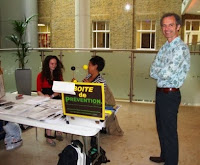
WELCOME
DRUG PREVENTION CASE©Dr. Luís Patricio
Pedagogic / Training case
Prevention of misuse and abuse of
psychoactive substances
and of others attitudes and risk behavior

I - Introduction
The diffusion of one idea, through the manipulation of one object materialized, maybe of banal use, will contribute to interiorize a concept.
When one emitter sends information, we can have its better reception if the matter contained stimulates a dynamic relation.
The Drug Prevention Case is an instrument designed to stimulate reflection about the value of the promotion of education to health and welfare, putting in relief the prevention of pathological dependencies and risk behaviours for individual and family and social health.
II - Objectives
• To empower adequate information in order to carry out training with established criteria, and thus to contribute to education for citizenship
- To demystify the concept of ‘drugs’
• To stimulate capacities to observe, learn, think and choose
• To understand the concept of ‘psychoactive substances’
• To recognize the psychoactive substances that are around
• To understand the concept of damaging or harmful consumption
• To increase the knowledge about the misuse and abuse of substances and also to promote the capacity to recognise and face harm behaviors to health.
• To increase the valuation and respect for health, the responsibility of the one that educates and the ones who take on the apprenticeship.
III - Material
The Drug Prevention Case contain a number of utensils, objects, games, books, pedagogical videos with statements from professionals of several countries, pedagogical cards and slides in informatics support, legal substances and replicas of illegal substances.
Disposable in three modules
- Teachers. • Parents and referrals. • Health professionals.
To be used in different settings:
Schools, universities, health centres, communities, families, local enterprise, social exclusion, outreach work and prison.
IV - Method
Interactive training To increase the communication, using objects and the game to create pleasure with the apprenticeship, if possible with a pre selected group, using a common language with the participants.
Instruments for the action
1 Auditorium
2 Scene/ Drug Prevention Case
3 Director / protagonist
4 The group or the individual
Session stages:
1. Presentation
2. "Warm-up"
3. Action
4. Evaluation/Comments
V - Results
The training sessions are always evaluated.
In Autumn Scholl, (Socidrogalcohol2009), workshop of 5 hours with the Drug Prevention Case, the self evaluation made by the participants on a scale 1 (few) to 5 (good), shows knowledge changes.
Level before the action: 1 – 11,1%, 2 – 22,2%, 3 – 55,5%, 4 – 11,1%, 5 - 0%
Level after the action: 1 - 0%, 2 - 0%, 3 -11,1%, 4 - 55,5%, 5 -33,3%
VI - Discussion
Applying to the individual and group interaction, with the support of real objects, we try to promote the reflection.
Through the spontaneous or directed play or role play, we look for solutions for a concept, in order to pass from the real to the symbolic and we promote with dynamism education concepts to health face the consumptions and risk behavior.
VII - Conclusion
If adequate information and the criteria’s formation and also the education for citizens, are references to increase the responsibility to face the substance damage consumptions and other risks behaviors, changes will appear as result of dynamic intervention sessions.
VIII – Bibliographic references
Elisardo Becoña Iglesias. Bases científicas de la prevención de las drogodependencias. Delegación del Gobierno para el Plan Nacional sobre Drogas. Madrid, 2002.
Patrício, Luís D., Droga: Aprender para Prevenir. Dias Patrício, Psiquiatria e Medicina Lda. Lisboa. 2006.
The Drug Prevention Case has already been used for education of professionals in
Bolivia, Cabo Verde, Colombia, Ecuador, England, España, France, Perú, Venezuela,
Portugal (Continental, Madeira and Azores).
Produced 18 cases.
English version with Mr.Kazim Kam (T3E UK) & Dr. António Miguel Ferreira (Portugal)

